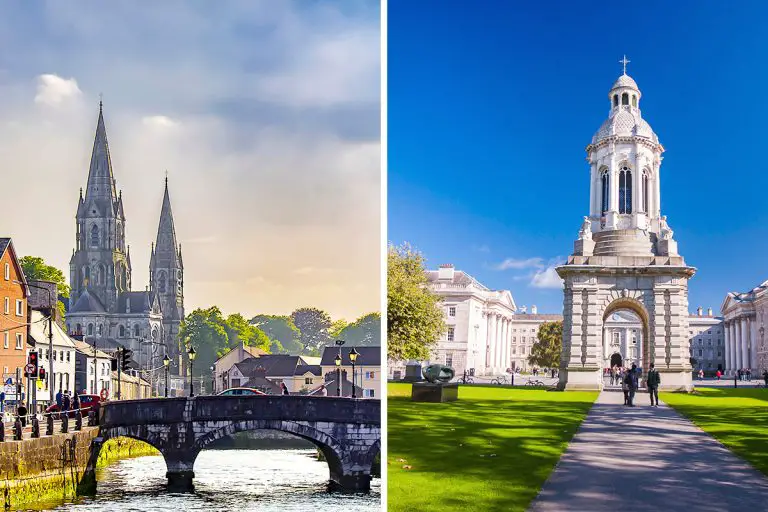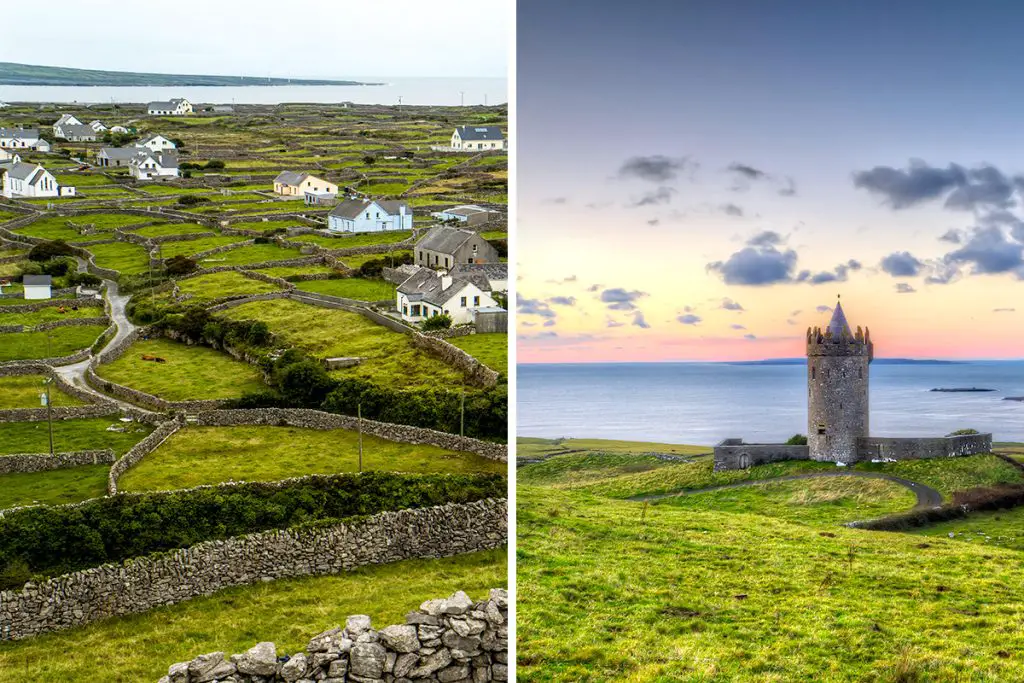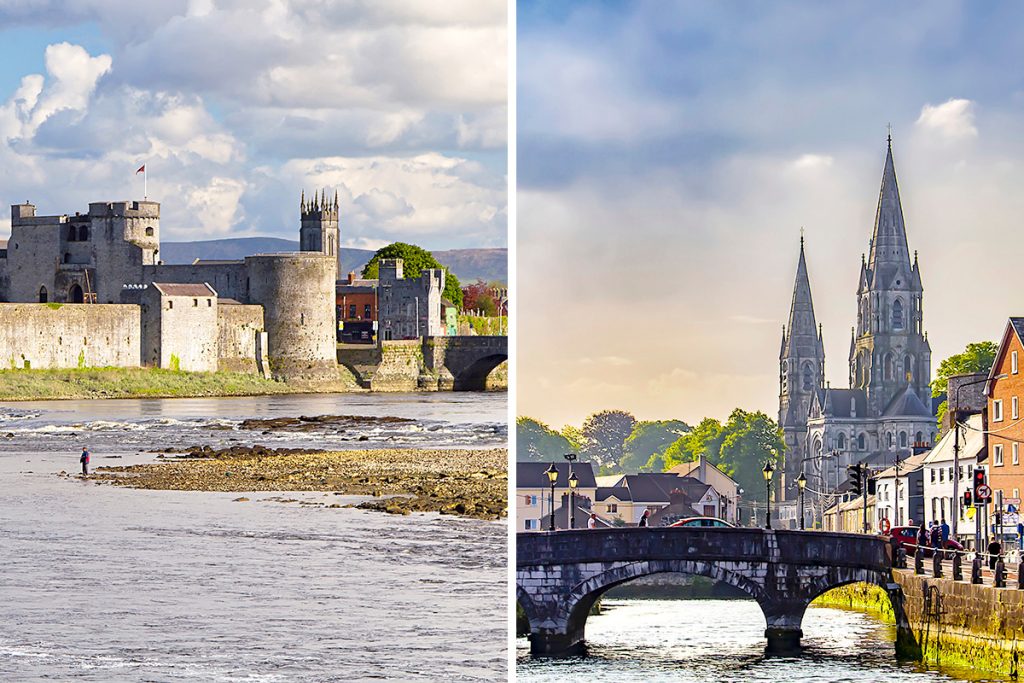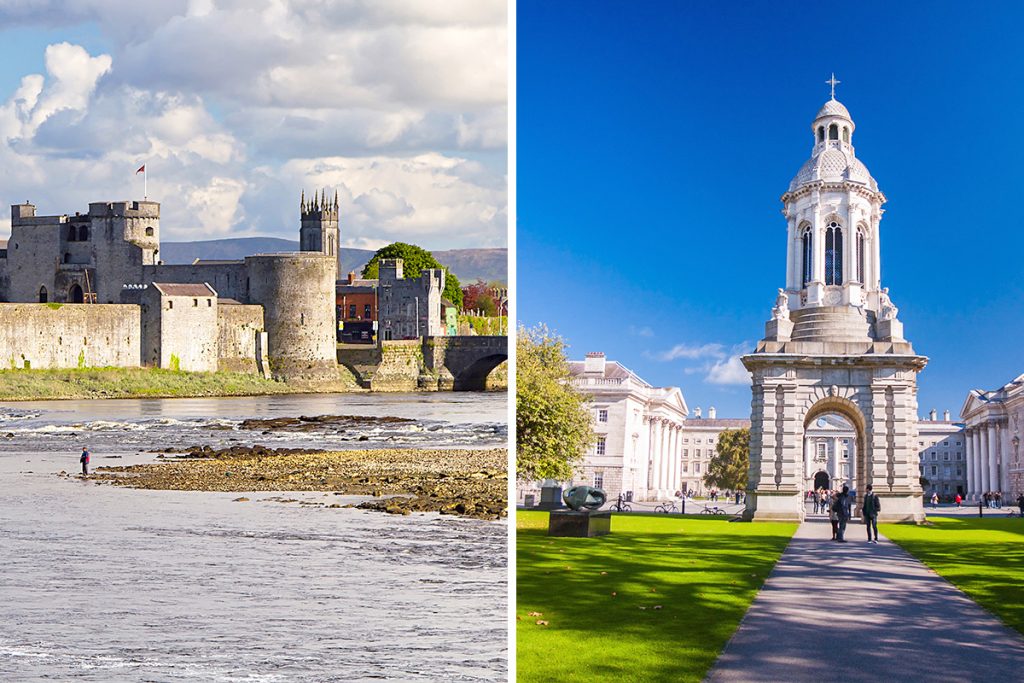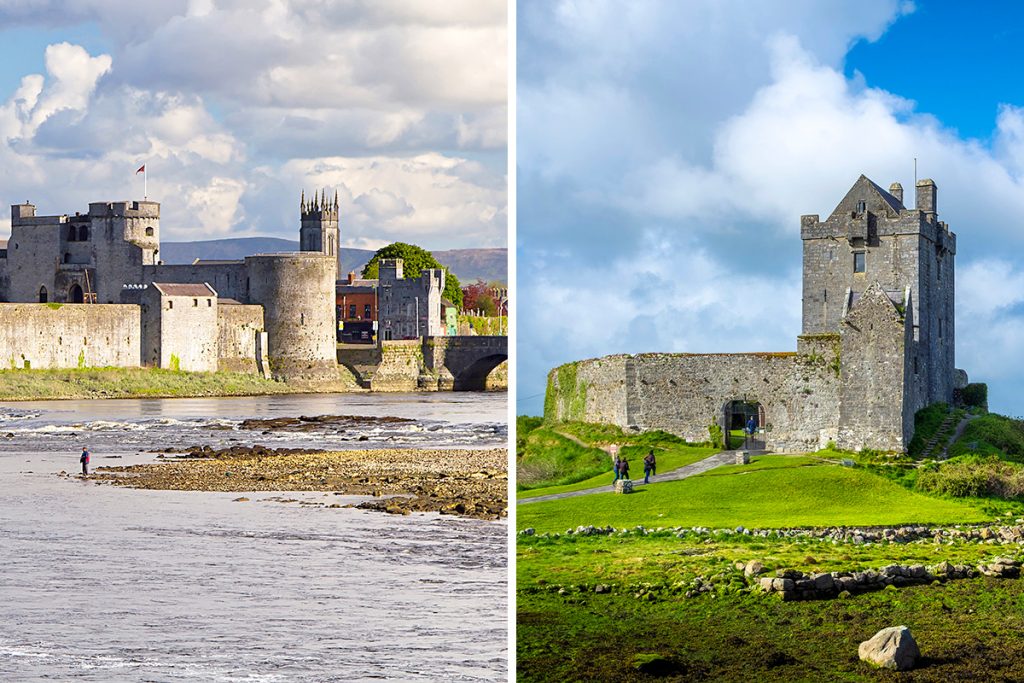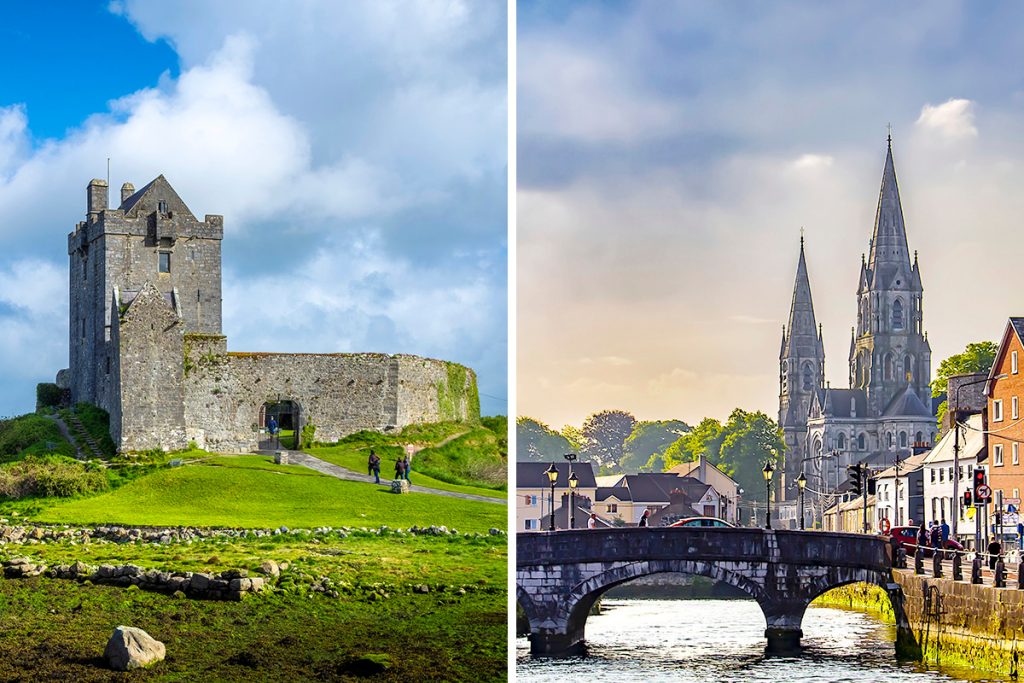In Ireland, both Cork and Dublin hold their own allure. Cork’s ancient whispers contrast beautifully with Dublin’s lively chatter. Do you lean towards the quiet allure of history or the pulsing heartbeat of a modern city? This is a question only you can answer. Keep reading to dive deeper into the charms of these cities.
History & Culture
Let’s start our journey with the intriguing histories and rich cultures of both cities.
Cork, fondly known as the ‘Rebel City’, takes immense pride in its independent spirit. Steeped in centuries of history, it’s a place where past and present beautifully intertwine.
As you stroll through the city, you can almost hear the whispers of ancient tales and the faint echo of rebellious cries. From the time of Viking invasions to the Irish War of Independence, Cork has a storied past that is palpable in its atmospheric lanes and old structures.
Dublin, on the other hand, is the vibrant capital city that offers a different flavor of Irish culture.
While it also possesses a significant historical backdrop, Dublin is more about the here and now. The city is an exciting blend of old traditions and new ideas, always buzzing with life and energy. From the historic Trinity College to its cutting-edge tech scene, Dublin seamlessly blends the past with the present.
The difference between Cork and Dublin’s culture is quite like a delightful dance of contrast. Cork’s culture is deeply rooted in the traditional Irish ways of life, music, dance, and folklore. It is the gateway to the Gaeltacht (Irish-speaking regions) and is the keeper of the Irish language. The city has a more laid-back vibe, with locals holding on to the time-honored ways and customs.
In Dublin, while the culture has its roots in Irish traditions, it also embraces modernity and diversity. The city is a melting pot of different cultures from around the world. This global influence adds a lively rhythm to Dublin’s cultural scene, with festivals, music, art, and theatre creating a vibrant tapestry of experiences.
In conclusion, both Cork and Dublin offer rich slices of Irish history and culture, but each city presents it in its unique way. The serene antiquity of Cork and the dynamic modernity of Dublin are facets of the same Irish spirit. Your preference would depend on whether you want a journey back in time or a walk through the lively lanes of a bustling city.
Attractions & Activities
Every city has its own heart, and it beats in the attractions and activities it offers. Let’s explore the heartbeats of Cork and Dublin in this section.
Cork, the second-largest city in Ireland, serves up a delightful platter of attractions. Cork City Gaol, for example, transports you back in time with its impressive architecture and engaging stories. If you’re a history enthusiast, St. Fin Barre’s Cathedral, a splendid Gothic Revival three-spire cathedral, will leave you in awe with its history and architectural grandeur.
Looking for outdoor activities? Then make sure to take a leisurely walk around Fitzgerald Park, a beautifully landscaped oasis of tranquillity right in the heart of the city.
Dublin, as the capital, has an edge in terms of attractions. The famed Guinness Storehouse, often considered the top tourist attraction in Dublin, takes you through the story of Ireland’s iconic brew. For those passionate about literature, the James Joyce Centre celebrates one of Dublin’s most famous sons and offers a fascinating insight into his life and work.
Love being in the open air? Phoenix Park, Europe’s largest city park, offers plenty of space to walk, cycle, or simply relax and enjoy the greenery.
Activity-wise, both cities offer a great mix of indoor and outdoor experiences. Cork, for example, is perfect for scenic walks and bike rides along the River Lee, while in Dublin, you can enjoy an informative and fun hop-on, hop-off bus tour to discover the city’s top landmarks.
In summary, both Cork and Dublin provide a diverse range of attractions and activities. If you are someone who relishes the chance to step back in time and revel in the calm of nature, Cork’s offerings might resonate with you. On the other hand, if you like a bustling city vibe and the buzz of top tourist attractions, Dublin is your place.
Beaches
Who doesn’t love the feel of sand beneath their feet and the soothing sound of waves? Let’s now delve into the seaside offerings of Cork and Dublin.
While Cork is not directly by the sea, it’s nestled near some of the most beautiful coastlines in Ireland. Inchydoney Beach, just about 60 miles (or roughly 97 kilometers) outside the city, is a gem with its golden sand and turquoise waters. This beach is popular for its breathtaking views and pleasant atmosphere, making it an ideal spot for a peaceful day out.
Dublin, on the other hand, is perched on the edge of the Irish Sea and boasts several lovely beaches within a short drive. Dollymount Strand, only about 5 miles (or approximately 8 kilometers) from the city center, offers a long sandy beach and stunning views of Dublin Bay. It’s a favorite among locals and tourists alike for picnics, walks, and even kite surfing.
Cork also boasts the stunning Garryvoe Beach, roughly 25 miles (or about 40 kilometers) from the city, a wonderful sandy beach that’s perfect for a tranquil seaside escape. It’s known for its cleanliness and panoramic ocean views.
Meanwhile, Dublin’s Portmarnock Beach, located around 9 miles (or approximately 14 kilometers) from the city, is a haven for swimmers and sunbathers. This long sandy beach is also known for its fantastic views of the Dublin Mountains.
To conclude, both Cork and Dublin are gateways to beautiful beach experiences. Cork’s coastal offerings tend to be a bit further from the city but offer tranquil and scenic escapes, while Dublin’s proximity to the coast gives you the ease of enjoying beach days without straying far from the city’s heartbeat.
Eating, Drinking & Nightlife
Your travel experience in any city is never complete without diving into its culinary scene, savoring its drinks, and experiencing its nightlife. Let’s discover how Cork and Dublin compare in these aspects.
When it comes to eating, Cork proudly wears the crown of Ireland’s food capital. The city is famous for the English Market, a covered food market dating back to 1788. This historic spot boasts a variety of local produce, fresh seafood, artisan cheeses, and delectable baked goods.
For a sit-down meal, you can explore a range of eateries that offer everything from traditional Irish fare to international cuisine.
Dublin also has a vibrant food scene. The city is dotted with countless restaurants and cafés, serving up dishes that represent both Irish tradition and global influence. From the creative dishes in modern bistros to hearty meals in old-school pubs, Dublin has it all. Plus, the city’s multicultural character is reflected in its food, with cuisines from around the world readily available.
When it comes to drinks, both cities have their unique offerings. Cork is known for its craft beers and traditional pubs. In fact, the city is home to the Franciscan Well Brewery, one of Ireland’s longest-established craft breweries. Here, you can sample a variety of locally brewed beers and ales in a cozy, convivial setting.
In Dublin, Guinness is the name of the game. The city is synonymous with this world-famous stout, and a trip to the Guinness Storehouse is a must for any beer lover. You can learn all about the beer’s history and how it’s made, and of course, enjoy a pint with a panoramic view of the city from the Gravity Bar.
Nightlife in Cork is more laid-back and centered around traditional Irish pubs, live music, and friendly locals. The city’s nightlife maintains a unique Irish charm, with lively fiddle tunes filling the air in cozy, old-world pubs.
Dublin offers a more diverse nightlife scene. From traditional Irish pubs and sophisticated cocktail bars to bustling nightclubs, Dublin has something for everyone. The city’s Temple Bar district is especially well-known for its vibrant nightlife.
In summary, both Cork and Dublin provide a feast for food lovers, beer enthusiasts, and night owls. Cork will entice you with its local flavors, craft beers, and traditional Irish nightlife. Dublin, meanwhile, offers a cosmopolitan food scene, iconic Guinness beer, and a vibrant, varied nightlife.
Shopping
Shopping can be a delightful part of your travel experience, offering a chance to bring back unique souvenirs and gifts. Let’s see what Cork and Dublin offer in terms of shopping experiences.
Cork offers a mix of modern shopping centers and quaint boutiques. Merchant’s Quay Shopping Centre in the city center is a popular spot, with a range of shops offering fashion, homeware, and more.
For a more unique shopping experience, the narrow lanes of the Huguenot Quarter are filled with independent boutiques offering everything from Irish crafts to vintage clothes and antiques.
Dublin, as the larger city, offers more extensive shopping opportunities. Grafton Street is one of the city’s main shopping thoroughfares, with high-end brands, Irish design shops, and the iconic Brown Thomas department store.
The Creative Quarter, a vibrant district stretching from South William Street to George’s Street, is home to a mix of boutiques, galleries, and interior design shops.
Both cities host markets that are perfect for those looking for local produce and artisanal crafts. Cork’s English Market is a foodie’s paradise, while Dublin’s Temple Bar Food Market offers a wonderful selection of local food and produce.
In conclusion, if you’re looking to shop until you drop, Dublin’s wider range of stores and districts may be more appealing. However, if you prefer a slower-paced shopping experience with a focus on local and artisan products, you’ll find Cork’s offerings charming and satisfying.
Accommodation
A key element of any trip is finding a comfortable place to stay. Both Cork and Dublin provide a range of accommodations, catering to different tastes and budgets.
In Cork, you’ll find a delightful assortment of accommodations. Luxury lovers can check into the iconic Hayfield Manor, an elegant five-star hotel set in a tranquil setting. For a more budget-friendly option, the Garnish House offers comfortable rooms and a hearty breakfast.
Those looking for unique accommodations might enjoy the historic charm of the boutique hotel, The Montenotte, with its stunning views of the city.
Dublin, being the capital city, has a broader range of accommodations. For a touch of luxury, The Shelbourne offers an elegant and historic stay in the heart of the city. Budget travelers can find comfort and convenience at the Generator Hostel located in the trendy Smithfield district.
If you prefer a unique stay, why not book a room at The Dean? This boutique hotel is known for its quirky, modern design and rooftop restaurant.
In summary, whether you’re after luxury, budget-friendly, or unique accommodations, both Cork and Dublin have something to offer. Cork provides a mix of traditional charm and modern comfort, while Dublin offers a wider variety of options, catering to all tastes.
Family-Friendliness & Children’s Activities
Family travel is all about finding destinations that are engaging for children and relaxing for adults. Let’s compare what Cork and Dublin have to offer for families.
Cork is a wonderful city for families, boasting several attractions that are sure to delight the younger ones. Fota Wildlife Park, just a short drive from the city, offers a fun-filled day with animals from around the world. For an educational experience, the Lifetime Lab at Old Cork Waterworks provides interactive displays and fun science experiments.
Dublin, on the other hand, has a wealth of attractions for children. The Dublin Zoo in Phoenix Park is a major draw for families, home to a vast range of animals and a dedicated petting area. Another engaging attraction is the interactive Dublinia museum where children can learn about Viking and Medieval Dublin.
Both cities also offer open spaces for outdoor activities. Fitzgerald Park in Cork has a large playground and beautiful gardens perfect for a family picnic. In Dublin, St. Stephen’s Green is a great spot for a relaxing family day out, with a playground, duck pond, and plenty of green space.
In summary, both Cork and Dublin cater well to families, offering a blend of fun, education, and outdoor activities. If you’re looking for a city that is smaller and perhaps a bit more manageable with little ones, Cork might be your pick. However, if you prefer a city with a larger variety of children’s attractions, Dublin would be a great choice.
Getting There & Getting Around
Traveling to and around a new city can be a big part of your adventure. Let’s examine the transportation options in Cork and Dublin.
Getting to Cork can be done in several ways. Cork Airport, located just 5 miles (around 8 kilometers) south of Cork city center, connects with many European destinations. Alternatively, you could fly into Dublin Airport and take a train or bus to Cork. The train journey takes about 2.5 hours, offering a relaxing way to see the Irish countryside.
Dublin, as the capital, is more accessible. Dublin Airport is the busiest in Ireland, offering flights from destinations worldwide. It’s located just 6 miles (approximately 10 kilometers) north of Dublin city center.
Once you’re in the city, getting around Cork is quite straightforward. The city is compact, making it walkable for the most part. For longer distances, there’s a reliable network of city buses. Biking is another popular way to get around, with bike-sharing stations spread throughout the city.
In Dublin, the public transportation system includes buses, trams (known as Luas), and trains (DART). Dublin also supports cycling, with numerous bike lanes and bike-sharing options. However, Dublin is larger than Cork, so planning your journeys in advance can save you time.
To wrap up, both Cork and Dublin have efficient transportation systems, making it easy to get there and get around. Cork offers a smaller, more compact city that can be easily explored on foot or by bike, while Dublin, being a larger city, provides a comprehensive network of buses, trams, and trains.
Weather
When planning your trip, the weather can play a big part in deciding when to go. Let’s compare the climate in Cork and Dublin.
In Cork, the weather is mild and moderately rainy throughout the year. The average high in summer (June to August) is around 66°F (19°C), perfect for outdoor activities. The winters (December to February) are cooler, with average highs around 48°F (9°C), and it can be quite wet, so be sure to pack your rain gear.
Dublin, being on the eastern coast, experiences a similar climate to Cork but with less rainfall. Summers in Dublin are pleasant, with average highs around 68°F (20°C). Like Cork, winters in Dublin are chilly but not freezing, with average temperatures hovering around 48°F (9°C).
Both cities experience their warmest months between June and August and their coolest months from December to February. So, depending on what you prefer, you can plan your visit accordingly.
In conclusion, both Cork and Dublin experience mild and moist climates, with pleasant summers and cool, wet winters. If you prefer slightly drier conditions, Dublin might be the better choice. On the other hand, if rainfall doesn’t bother you, Cork offers the same pleasant temperatures.
Safety
Safety is always an important consideration when visiting a new place. Let’s explore the safety aspects of Cork and Dublin.
Cork, being a smaller city, generally has lower crime rates compared to Dublin. Residents and visitors alike often comment on the friendly and welcoming atmosphere of the city. As with any destination, it’s always wise to stay alert and keep your belongings secure.
Dublin, as a larger city, has a more varied safety record. While it’s generally a safe city, there can be instances of petty crime, particularly in tourist-heavy areas. But don’t let this deter you – by taking basic precautions like keeping valuables out of sight and avoiding less crowded areas at night, you can enjoy a safe and memorable visit.
One non-crime-related safety issue to consider when visiting Ireland is the country’s weather. The weather can change quickly, and it’s not uncommon to experience all four seasons in a single day. So, it’s always a good idea to carry an umbrella or rain jacket.
In summary, while both cities are generally safe, Cork’s smaller size and friendlier atmosphere might make you feel more at ease. However, with common sense and standard precautions, you can safely enjoy everything Dublin has to offer.
Cost
The cost of your trip can greatly influence your experience. Let’s compare the costs in Cork and Dublin.
In general, Dublin, as the capital city, tends to be more expensive than Cork. For instance, a meal at a mid-range restaurant in Dublin might cost around €20 ($22), while in Cork, the same might cost around €18 ($19.50). Similarly, a single public transportation ticket in Dublin costs about €3 ($3.50), while in Cork, it’s slightly cheaper at about €2 ($2.50).
When it comes to accommodation, Dublin’s prices are higher due to its status as a tourist hub. The average nightly rate for a double room in a mid-range hotel in Dublin is around €120 ($132), whereas in Cork, you could find similar accommodation for around €100 ($110).
Summing up, while Dublin offers more variety and larger scale attractions, these come with a higher price tag. On the other hand, Cork offers a more budget-friendly alternative without compromising on the richness of the experience. Regardless of your budget, both cities offer a range of options to suit your needs.
Which Is Better – Cork or Dublin?
It’s time to sum up our comparison between the two diverse cities of Cork and Dublin, each with its unique charms and attractions.
From a historical and cultural perspective, both cities shine, but they offer different experiences. Dublin, with its rich historical past and larger scale of cultural festivals, can be a paradise for history buffs. On the other hand, Cork, with its distinct maritime history and intimate cultural scene, offers a unique blend of historical and modern Irish culture.
When it comes to attractions and activities, Dublin takes the lead with its wide array of museums, galleries, and iconic landmarks. In contrast, Cork may seem quieter, but its picturesque landscapes, interesting local sights, and close proximity to some of Ireland’s most stunning natural attractions give it its unique charm.
As for the beaches, Cork’s coastlines are hard to beat, offering some stunning sea views and tranquil spots. Dublin, while it does have some beautiful coastline, doesn’t quite compare to the natural beach beauty that Cork offers.
In terms of eating, drinking, and nightlife, both cities have plenty to offer. Dublin, with its larger size and varied populace, provides a wider array of dining and nightlife options. Cork, though smaller, prides itself on its local produce, traditional pubs, and lively music scene.
The shopping experience is also quite distinct in both cities. Dublin, being the larger city, offers more upscale shopping experiences and international brands, while Cork offers unique local products and charming markets.
Dublin, as a popular tourist hub, tends to have a wider range of accommodations. But if you’re looking for more quaint, unique, and locally owned accommodations, Cork is the place to go.
As for family-friendliness and children’s activities, Dublin, with its numerous parks, museums, and attractions, offers more variety. Cork, while smaller, still offers plenty of kid-friendly activities and a more relaxed atmosphere.
Getting around in both cities is relatively straightforward. However, Dublin, being larger, has a more extensive public transportation network, while in Cork, the city center is compact enough to explore on foot.
The weather is quite similar in both cities, with mild summers and cool, wet winters. If you prefer slightly drier conditions, however, Dublin might be the better choice.
While both cities are generally safe, Cork’s smaller size and friendlier atmosphere might make you feel more at ease. But with basic precautions, you can safely enjoy everything Dublin has to offer.
Finally, the cost of living and traveling in Dublin is generally higher than in Cork. Dublin offers more variety and larger-scale attractions, but these come with a higher price tag.
In conclusion, the choice between Cork and Dublin largely depends on what you’re looking for. If you want a bustling city with a myriad of attractions, a vibrant nightlife, and don’t mind paying a bit more, Dublin is your city. If you’re seeking a more laid-back vacation, with charming local culture, scenic beauty, and a more relaxed pace of life, Cork will be the perfect destination. Either way, both cities offer a unique and unforgettable Irish experience.

